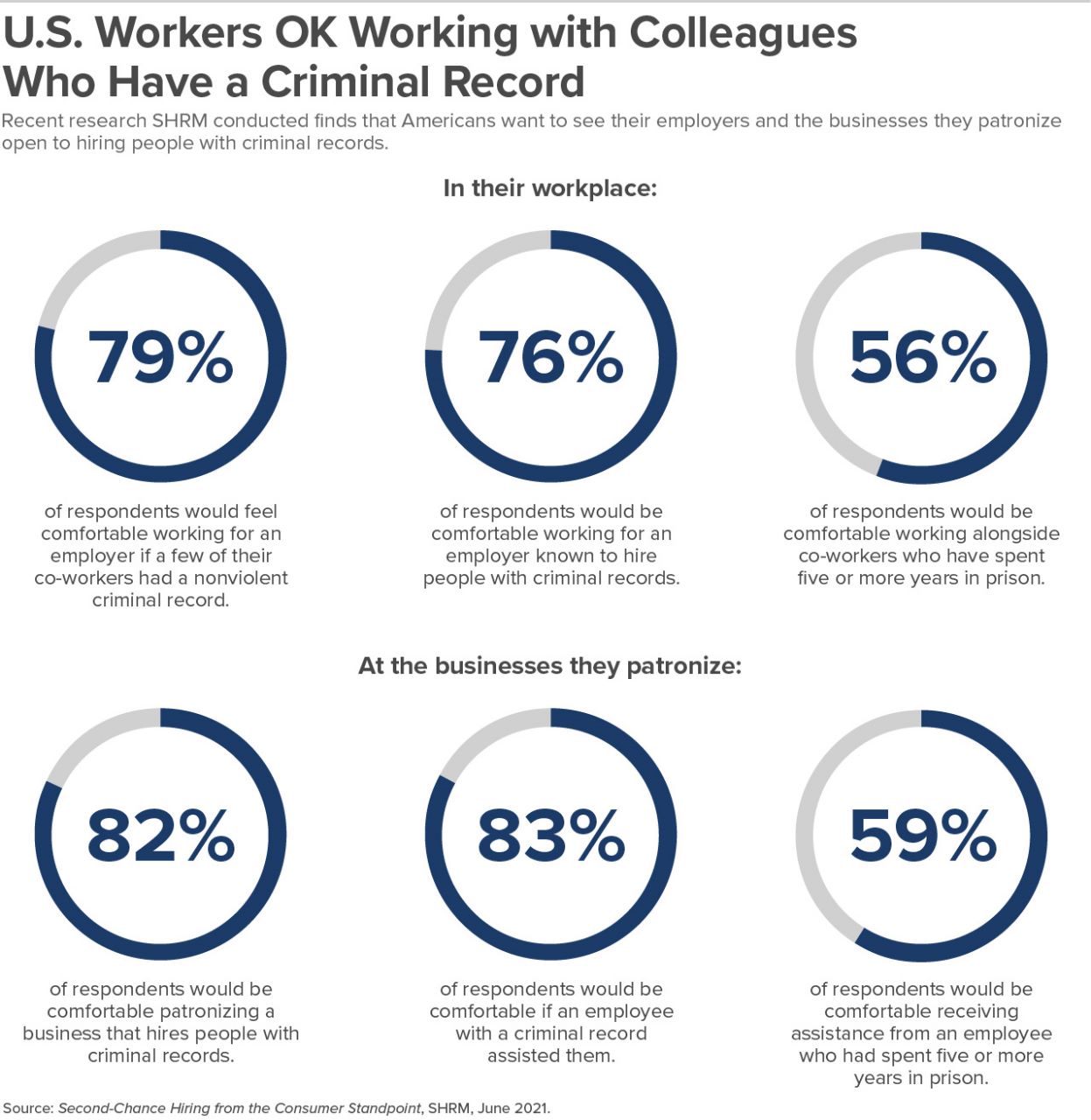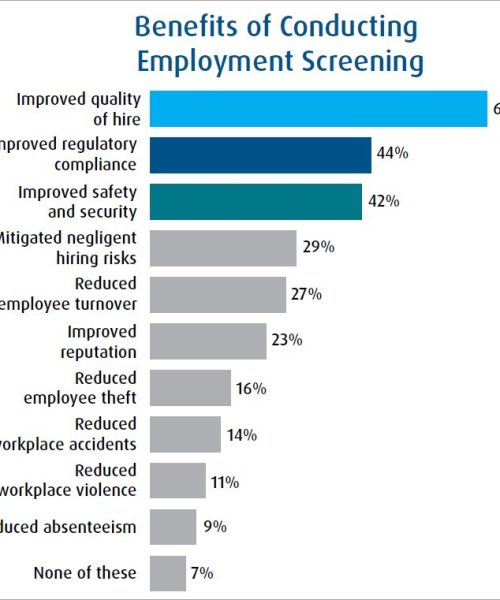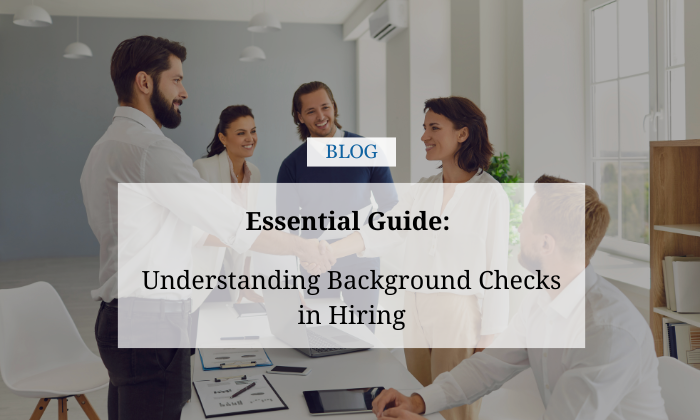The importance of pre-employment background checks is often understated in many hiring processes. However, performing background checks on prospective employees can offer a wide range of perks to employers and their businesses. Not only do they provide insights into an individual’s criminal history, but also the ability to uncover any potential dishonesty or misrepresentation of facts during the interview process. Furthermore, these checks can provide invaluable information about an employee’s professional references and past employment history. This article will explore the various benefits of implementing pre-employment background checks into your hiring process. Additionally, this article will discuss how pre-employment background checks are done, what does a pre-employment background check include, and how to make sure these checks are conducted in a way that is both legal and efficient.
Why conduct Pre Employment Screening?
Employers who use pre-employment screening as a part of their recruiting process realize several important benefits. One of the basic advantages is a general improvement inside the nature of potential candidates which eventually prompts better workers, expands efficiency, quality, and lower employee turnover resulting in employee retention. Declaring to all candidates the aim to conduct background checks will discourage some job applicants from applying. At a minimum, a candidate will be more likely to represent themselves honestly.

Factually 60% of all resumes contain inaccuracies in employment, job performance, and educational achievement. Altogether, the declaration will energize some high-risk applicants with criminal backgrounds to eliminate themselves, which may save time and money in the recruiting process. Conversely, the declaration does not discourage good qualified job applicants who know their background check will not reveal significant problems.
What is the main purpose of Pre Employment Screening?
Pre-employment screening is a process employers use to determine whether an applicant is suited for a particular job. I’m sure you must be curious about what is the main purpose of pre employment screening.
The main purpose of pre-employment screening is summarized in the list below:
- Pre-Employment Screening provides you with a meticulous overview of candidates, which will improve your chances of making the right choice.
- Background checks performed prior to a hiring decision check potential risks that could negatively influence the company, such as theft, violence, or substance abuse.
- Recruiters are able to make an evidence-based selection of candidates by analyzing the information contained in pre-employment screening.
- Using Pre-Employment Background Screening, employers have the opportunity to look through a pool of candidates to find the best fit for their skills.
- Pre-employment screening can help you determine whether a candidate is qualified for a given position and whether they possess the proper abilities and knowledge.
What are the Benefits of Pre-Employment Background Checks?
Pre-employment screening programs, commonly known as background checks, are an essential part of the hiring process for many companies. A Pre-employment screening program can provide employers with valuable information about a job candidate’s past, including criminal history, employment history, and education.
Pre-employment screening checks can help employers avoid hiring candidates who may be unsuitable for the position or pose a risk to the company. For example, a candidate with a history of violence or theft may not be suited for a position that involves handling money or working with customers. Employers may also use background checks to verify the accuracy of a job candidate’s resume or application.
Pre-employment screening checks can be an important tool for protecting your company’s assets and reputation. By taking the time to conduct a thorough background check on ideal candidate, you can help ensure that you are hiring the best possible employees for your business.
A third-party background screening provider can help you plan a program specifically customized to your company requirements. Few of the greatest benefits you will experience when implementing fully comprehensive solutions are:
Improved Quality of Hire
If a potential candidate distorts their employment history, education, certification, criminal history or employment eligibility, not only could it result in a poor hire, it could also potentially bring about budgetary, legitimate and regulatory risks for the hiring company. A background screening program can help uncover false or misrepresented information early on and prevent future risks and elevating talent acquisition costs.
Decrease Negligent Hiring Risks
Negligent hiring claims may arise, for instance, when a worker cause’s harm to a co-worker or third-party within the scope of their job and the victim claims that the worker had a record of or inclination for causing this sort of harm that the employer should have discovered if it had conducted its due diligence. If this allegation is claimed, then the employer may be liable for negligent hiring damages.
A careless hiring lawsuit can bring about legal expenses, settlements, and reputation harm. According to a recent survey by the Society for Human Resource Management (SHRM), the average settlement of a negligent hiring law suit is close to $1 million, although some cases have resulted in settlements in millions of dollars.
Enhanced Regulatory Compliance
Compliance is one of the most important aspects of pre-employment background screening in the U.S. regardless of how good your background screening partner is, if they don’t comply with all the laws and regulations you, as an employer, might be in serious trouble.

Employers must know that:
- There is a law in the U.S. that enables background screening records to be preserved and referred to for a maximum duration of 7 years and 10 years in case of bankruptcies. Once this period is finished, the record will not be legitimate and any adverse action made dependent on such records will be illicit as defined in the Statute of Limitations.
- There are certain restrictions when it comes to screening information about issues of sex, race, disability, religion or age. For instance, an employer cannot ask for background information from candidates of a specific race solely because they belong to that race.
- In California, employers cannot demand criminal record checks of the candidate before an employment proposition is made except if you are from a job market that makes contact with the growing population.
- Several cases have been filed against employers for alleged non-compliance in background screening. The most common non-compliance example includes an employer’s failure to provide proper disclosure, authorization and follow the adverse process mandatory under the FCRA guidelines. Apart from the FCRA , various other compliance norms in the U.S. need to be followed by background check agencies. These include multiple compliances, FTC, State, and City Ban-the-Box laws and the newly updated EEOC guidelines.
A third-party background screening support with in-house screening specialists can help your association properly make a screening solution that not only fulfills industry standards, but also local, state, and federal regulatory requirements, which vary from state-to-state and by type of the position you are recruiting.
Without an effective pre-employment screening program, an organization could face costly fines, loss of privileges or legal damages. During each step of the pre-employment screening process, from background checks to completing an electronic I-9 employment eligibility verification, a background screening provider can help you implement a compliant screening program for your company.
Encourage a Drug-Free Workplace
Alcohol and drug abuse can create a significant safety threat in the workplace and can result in minimizing employee productivity. Implementing a clear and consistent drug testing policy within the workplace deters employees from abusing alcohol, drugs, and helps companies hire responsible job applicants. Make sure you screen applicants with the right consumer reporting agency.
Advance Workplace Safety
Pre-employment background screening helps greatly reduce the chance of future workplace violence by filtering out applicants that could present a threat to the workplace environment. Comprehensive pre-employment background screening will detail past incidents that may provide critical insight into behavioral habits that could pose a threat in the future.
The U.S. Chamber of Commerce, in association with the American Management Association, evaluates that 30 percent of all business failures are a result of employee theft and that three-quarters of all employee’s steal at least once. An FBI study featured that about 355,000 organizations will encounter a workplace violence episode in any given year. Employers can conduct background screening to increase the quality of hire that better protects property and employees against damaging workplace accidents, violence and thefts.
What does a Pre-employment Background Check include?
Generally, a pre-employment background check consists of (but are not limited to) the following checks:
1. Major Criminal Felony Check
Felonies may be reported indefinitely or be limited to 7 or 10 years, depending on which state the offenses were committed.
2. Minor Criminal Felony Check
Being subject to misdemeanor limits may be for 5, 7, or 10 years, depending on the state.
3. Employment History Check
It may be verified during the lifetime of the person.
4. Educational History Check
It may be verified during the lifetime of the person.
5. Professional License Validation
It may be verified during the lifetime of the person.
6. Credit History Check
In general, credit checks last 7 years, or 10 years depending on the candidate’s expected salary and specific state laws
7. Driving Records Check
Different jurisdictions have different requirements regarding driving history, with records commonly being valid between 3 and 10 years, on average.
How long does Pre-employment Background Checks take?
Since there are such a wide variety of reports employers can run on a job contender, completing a full pre-employment background check has a lot of variables. As a rule, in most cases, a set of pre-employment background checks might normally be used by a company within a range of days.
Are Pre-employment Background Checks legal?
Pre-employment background checks are a key component to the hiring process for many employers. Such checks help to ensure that employees meet the criteria and standards required for positions within the company. But, when it comes to pre-employment background checks, are they actually legal? The legality of such practices is an important question that must be answered in order to understand the potential risks associated with them.
Employers must be aware of the legal limits when conducting pre-employment background checks. To ensure compliance with relevant state and federal laws, it is important to understand the legal framework surrounding these types of inquiries. We have to consider a wide range of factors including the Fair Credit Reporting Act (FCRA), Privacy Laws, EEOC Regulations, and more. Laws vary from state to state, but all employers must ensure they are in compliance with any relevant statutes or regulations governing their ability to conduct pre-employment background checks.
What Can Disqualify You on a Background Check?
There are multiple ways an applicant can be disqualified for a job based on a pre-employment background check. Some of these include having a criminal record, claiming more education than you have, having a poor driving record or credit record, falsifying your employment history, and failing a drug test. Each of these red flag issues is detailed below.
1. Criminal Record
The National Conference of State Legislators reports that an estimated 77 million Americans have reportable criminal records for employment background checks.
Whether or not an applicant might be disqualified for employment based on a criminal record will depend on multiple factors, including the particular job for which he or she has applied, regulations that apply to the industry, and others. In some cases, denying employment to someone based on his or her criminal record might be considered to be unlawful discrimination.
2. Fluffing Educational History
Some applicants try to fluff their resumes by claiming educational qualifications they have not received. However, doing this is never a good idea. When an employer requests an education verification as a part of its pre-employment background check, the employer will be able to confirm the applicant’s degrees, diplomas, certificates, educational institutions attended, and the dates of attendance.
3. Poor Credit
Some industries check the credit records of applicants. For example, applicants may have their credit records checked to obtain federal security clearances or work for financial institutions. Some states restrict the ability of employers to rely on credit history information when making employment decisions, however.
If an employer is allowed or required to request a credit check on an applicant and spots problems, the employer might have concerns about the applicant’s financial responsibility and integrity.
4. Poor Driving Record
For applicants applying for jobs in which they will have to drive a company vehicle or a commercial truck, driving records checks are commonly requested. This type of check helps employers to ensure that their applicants have the required driver’s licenses for the positions and are insurable through their commercial insurance companies.
An applicant for a position for which driving will be required may be disqualified for the job based on a poor driving record. Without this type of check, the employer might face insurance and legal consequences if the applicant is hired and causes an accident while on the job.
5. Falsifying Past Employment Information
Most employers request employment verification to confirm that their applicants have held the positions they have claimed and their employment dates at each employer. When an employer discovers that an applicant has falsified past employment information on his or her resume, the candidate will be unlikely to be hired for the job.
6. Failing a Pre-employment Drug Test
Employers can face significant liability risks when their employees use illegal drugs. If an employer requests pre-employment drug testing and finds that the applicant has used an illicit substance, the employer can use that information to make an adverse hiring decision.
Does Pre-employment Screening mean I got the job?
Pre employment screening is an essential step in the hiring process. It can provide employers with valuable insight into a potential employee’s past, and can help them make an informed decision about who to bring into the company. However, it’s important to remember that passing this screening does not guarantee you the job. Pre employment screening can be seen as an indication that this may be the case, but it is important to understand the purpose of the process.
For more information on pre-employment background screening please call 855-955-4777, visit www.securecheck360.com or mail us at [email protected]







